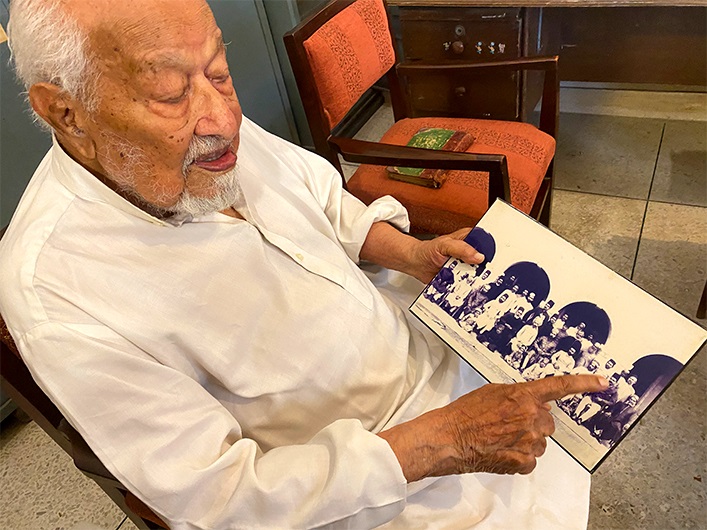KARACHI: A 100-year-old Pakistani, who received a coronavirus jab earlier this month, urged people this week to take necessary precautions against COVID-19 and get themselves inoculated to prevent the spread of the disease, saying there was no ‘rational’ reason to mistrust vaccines.
It is believed that Israil Ahmed Menai is the oldest person in Pakistan to get vaccinated so far.
“Such pandemics come and go,” Menai told Arab News in an interview at his residence in Karachi. “People should exercise caution like they have done in the past in similar situations. There is no need to be scared.”
“Life is a blessing,” he added, while praising the government’s vaccination drive. “I see no rational basis for people to be doubtful about coronavirus vaccines. For every ailment there is a cure which is administered by health experts.”
Pakistan’s southern Sindh province has received 337,000 doses of the coronavirus vaccine for frontline health workers and senior citizens of 60 years and above. According to official data, 175,266 people were immunized in the province as of this Monday, including 22,687 elderly people.
Menai received his first dose on March 12 and will get a second shot on April 5.

100-year-old Israil Ahmed Menai, receives first dose of coronavirus vaccine in Karachi, Pakistan on March 12, 2021. (AN Photo)
“I got the first instalment of the vaccine and it did not cause a reaction,” he said. “It was like a normal injection. I will advise all my friends and well-wishers to get this medicine [vaccine] without hesitation.”
Born in Rampur in present-day India on September 30, 1920, Menai celebrated his 100th birthday last year. His grandfather was the famous 19th century Urdu poet, Ameer Menai, and he received his early education in his hometown before going to Osmania University, Madras, for higher education.
After his family moved to Pakistan in 1950, Menai went to the Fletcher School of Law and Diplomacy and to Harvard University on a Fulbright Scholarship. He started practicing law upon his return to his family’s newly adopted country and stayed in the profession for 70 long years before suffering a cardiac arrest about six years ago.

100-year-old Israil Ahmed Menai, who received his first dose of the coronavirus vaccine two weeks ago, shows an old photo from his family album on March 23, 2021, in Karachi, Pakistan. (AN Photo)
He still occasionally visits courts and spends his free time in bar rooms.
When the coronavirus pandemic struck last year, it was not the first time Menai’s life has been threatened by an infectious disease.
“My first experience with a pandemic was in 1936 when a plague started spreading,” he recalled. “Since there were limited communications means and news did not travel as fast as it does now, it looked like a local phenomenon. The world has now transformed into a global village. Things that happen here get immediately reported in places as distant as New York or Seattle.”
Menai said his experience of the two pandemics was different for many reasons, but one commonality was the will of people to live and use all available resources to protect themselves.
“We may witness yet another pandemic in the future,” he added. “But man has always strived for his existence and health. These efforts [to produce and administer vaccines] are a continuation of the same thing and will also endure in the future.”


















